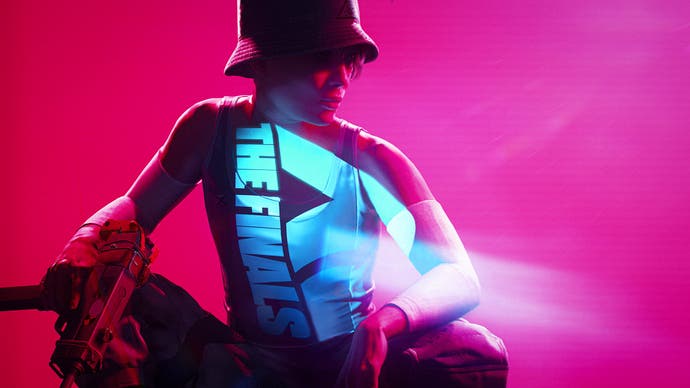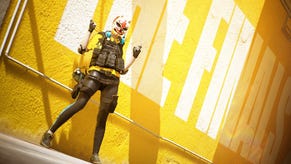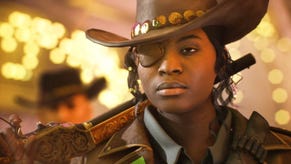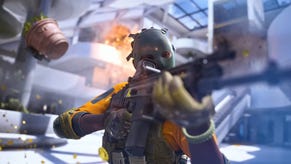The Finals is borderline irresistible, and it's about to be massive
Knockout.
I can't remember having this much fun with a multiplayer shooter since Overwatch - not initially at least. The Finals feels so immediate in the impact it has. You load it up, you're thrust into a three-player team and then into an arena with other teams, then you're legging it through levels that are being bust apart around you, rappelling up buildings, smashing through walls, lobbing foam-expanding grenades and swinging heavy sledgehammers. Then you're legging it back another way with a safe of money you've found, trying to deposit it at a vault, all while the other teams frantically pepper you with bullets and hunt you down. There's no breathing space. There's garish colour, noise, energy, adrenaline and excitement. That is The Finals.
It really reminds me of Overwatch, actually, in how polished it feels and how the menus look. I suppose the polish should be no surprise given The Finals released today, in conjunction with The Game Awards, and I played it only a week ago. It's the final build.
But the Finals reminds me a lot of Fortnite, too, in the way it has three-player teams and silly cosmetics, and a big Battle Pass. But it's Battlefield 4 too, in the way the levels can be blown up around you. And it's Payday in the way you chase cash, like an extraction shooter, and it's maybe Apex and Rainbow Six Vegas and a bunch of other games as well. It's a Frankenstein's Monster made up of all of those things, and yet, like that Monster, it manages to be its own very distinct thing.
Let's rewind a bit. Chances are you've already played The Finals, because there was an open beta test earlier this year that 7.5 million people joined in on. Things haven't changed drastically since then but a new Vegas map has been added for launch. If you don't know, though, The Finals is an arena shooter themed around the idea of a huge game show, in which teams compete for cash and the chance at reaching, ultimately, the finals.
You earn cash by picking up deposits - small safes - which you then deposit at vaults on maps. There's a tutorial at the beginning where you do these two things and then the game is like, "Cool! Now play!" - as if these are the only things you really need to know about how it works. Then when you're in the game, you see the deposits and vaults marked on your map, and so do the other teams, so you'll all be funnelled together to fight over them.
Something else that's important about The Finals is that it's a "hero builder". Note how I didn't say "hero shooter" - The Finals has its own proprietary marketing language that made me feel queasy when I first heard it, but now that I've played a bunch of it, it actually makes sense. This isn't the same as Overwatch - there aren't character classes in the same way - nor is it a Fortnite approach where everyone can do everything.
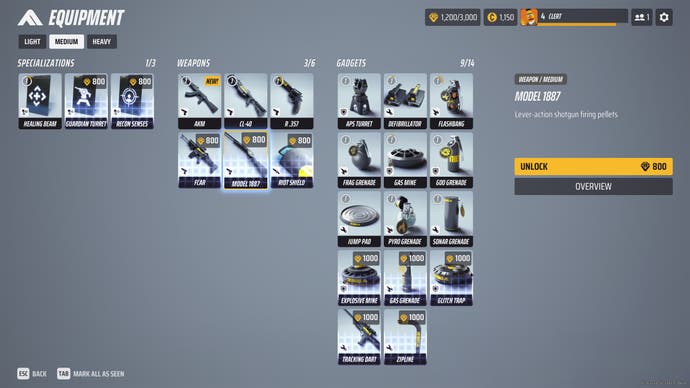
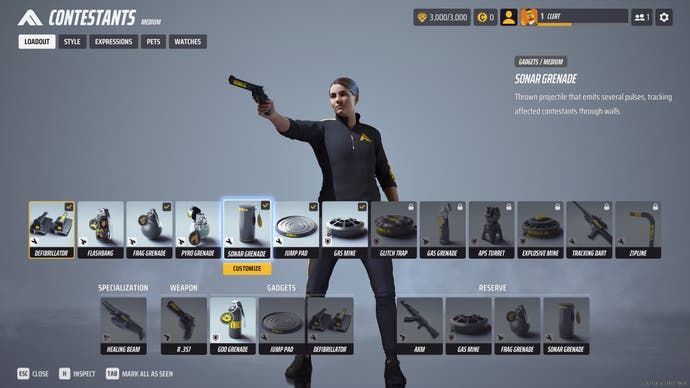
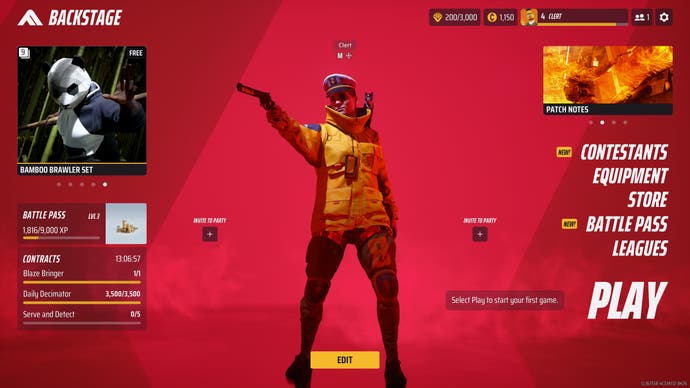
Your role broadly depends on the size of the character you choose to play as - small, medium or large. The smaller you are, the faster you are, but also the more fragile you are, whereas if you're large, you're big, sturdy and slow. Medium is obviously somewhere in the middle. Each of the character types has access to different weapons, gadgets and abilities. The heavy character, for instance, can shoulder-charge and plonk down shields a bit like Reinhardt, and carry really big guns. The smaller character can use a grappling hook, which is really useful for getting around quickly, and do things like stealth (I didn't play as them so I'm a little foggier on their specifics). And the medium character can use a healing ray and equip things like a defibrillator for quick revives. That's not everything they can do by the way, just a glimpse.
But though The Finals has a healing ray (and I played primarily as the medium so I'm zooming in a bit here) The Finals isn't intended to be a holy trinity kind of gaming experience. One person isn't going to heal the team while the others tank or kill. The healing is there more to speed recovery between bursts of battle - to get you out of cover again quicker. The emphasis all over is on aggression. It's everyone's role to kill.
Exactly what equipment your character packs is up to you. The only limiter is what you've unlocked in the game and how many hotbar slots you have. And importantly, while you do unlock equipment with a form of currency in the game, that specific currency is only earned by playing, Embark - the developer - assures me. There's a separate, buyable currency that's used for cosmetics and the game's Battle Pass.
As teased above, another huge part of The Finals is destruction and a sense of physicality that comes with it. You can smash through walls and shoot ceilings down and entirely rearrange buildings this way. Routes that were there at the beginning of the level will vanish, and new routes will open up. Everything is built around this - explosives, explosive pick-ups on the levels, special events that happen mid-match. The levels are designed to be rearranged.
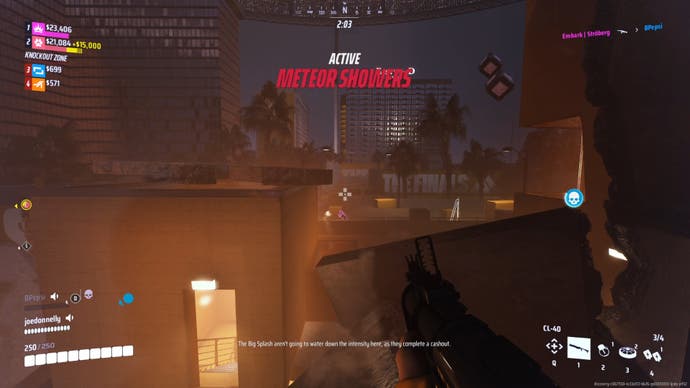
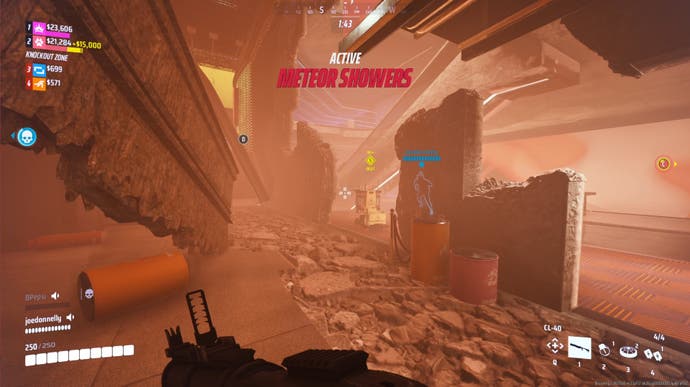
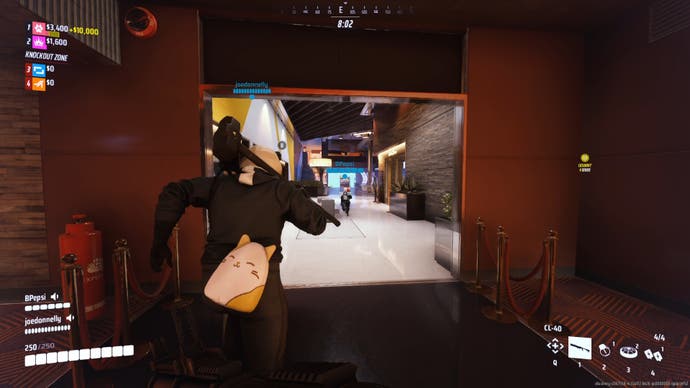
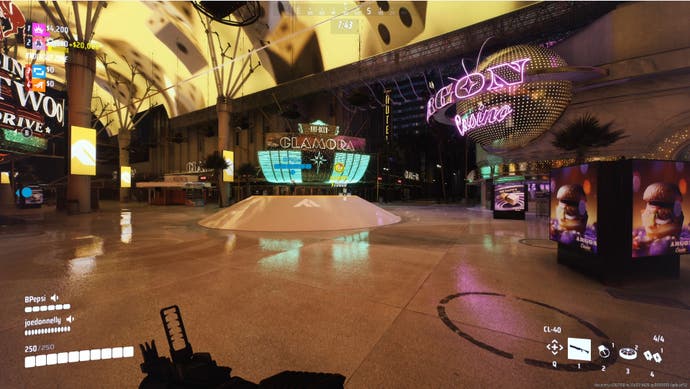
They're also designed to be like huge chunks of Swiss cheese, with many, many routes through them. There are ropes dangling everywhere to climb up to the tops of buildings, there are zip wires to get from one building to another, and there are jump pads to boost you straight up. The Finals wants you to be very mobile all of the time. Rarely will you have a firefight where everyone is on the same floor.
Tying into this movement and energy is the game's game-show heart. This is an amped up experience - loud and proud - a bit like watching sports on TV in America. And to ensure people don't get bored while viewing (whether in the fictional game-show world or watching online) there are events and variants the game mixes maps up with.
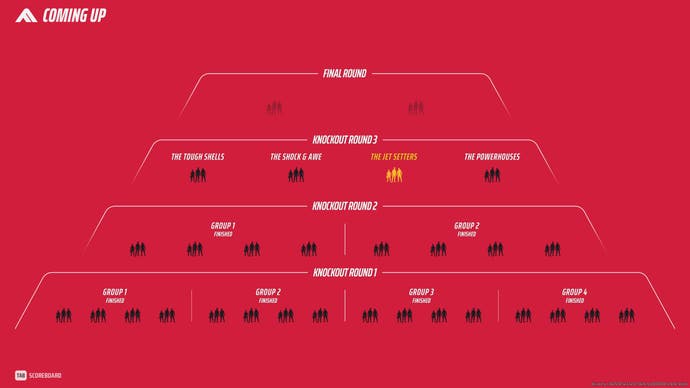
Events are things like - I kid you not - UFOs that tractor-beam huge chunks of the level into the air and then drop them, causing huge structural damage. Or there are low gravity moments, or "dead go boom" moments where people explode when they're killed. You can tell how not-serious it all is, right?
Variants, on the other hand, are game-length effects like sandstorms, or tripwires and traps, each of which fill maps and make them a significantly different experience to play. So while there are only four maps, there are multiple variants and events for each (and different times of day), which - together with the unpredictable destruction - makes each time around feel new.
Another big part of the game-show experience is commentary. Think of it like a sports game in how commentators react to how your team is doing. Your team is assigned a name - we were called The Vogues at one point - and then the commentators say things about you, like, "Oh no! That's a team wipe for The Vogues," or, "The Vogues are back up and back in," or, "The Vogues are making a remarkable comeback." Those aren't exact quotes but you get the gist of it. In play, it works really well - it's nice to feel seen and responded to.
But this commentary has been a bone of contention for the game too, because developer Embark has used AI text-to-speech voice over to generate some of it. This caused a stink when people originally found out, earlier this year, and it's remained a point of controversy since. When I speak to Embark in an adjoining interview, it's clear the studio doesn't want to say much more about it, but I push and Sven Grundberg, director of communications & brand, offers this: "So the way we are working with voice actors and with voice over in the game is that we're using a combination of recorded voice actors and then text-to-speech that is based on contracted voice actors that we pay. So it's a mix, but it's all based on professional actors."
"Nothing is generated from scratch," Grundberg adds. "It's not generated from nothing - it's generated from existing voice actors. That is an important point." In other words, Embark paid for the voice work it then generated lines from.
I ask too about whether Embark's stance changed after the ferocious feedback it got, but the answer, it seems, is no. "We're going to continue to use that mix of recorded and TTS technology throughout, depending on the context," Grundberg says. "We're going to keep doing what we do there."
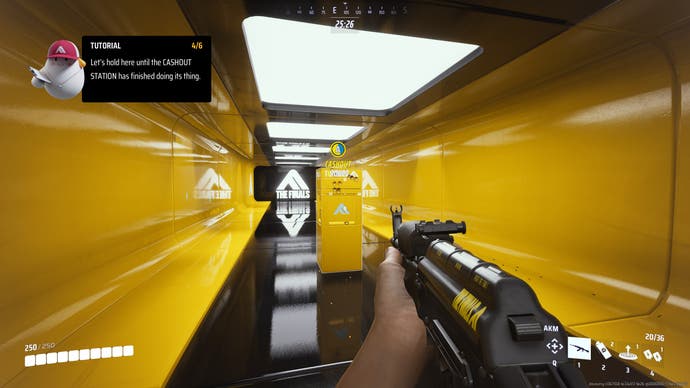
I wasn't expecting to be as taken with The Finals as I was after the few hours I spent with it. Something else that really impressed me was the built-in tournament system, which I can't remember seeing in a shooter like this before. And it just works. You are sorted into a tournament brackets, which you see mapped on the screen before you, then you progress round by round if you do well. And if you don't, don't worry - you'll be back out and into the equivalent of Quick Play before you know it.
How The Finals will work in the real world, on live servers, is of course the big question now. But that the game has survived busy betas already bodes well. Also, how varied the game feels after you spend a week with the four maps and three-and-a-half modes remains to be seen too, though of course there are many ideas within Embark for how to enlarge the game with new content after launch. And I wonder how the experience will feel once the meta settles and the wilder approaches disappear, and everyone focuses more on results. Will some of the fun seep out?
For now, though, it's wide open, and there's a joyousness and exuberance to the experience of playing The Finals that is borderline irresistible. I think it's about to have a very big moment indeed.
